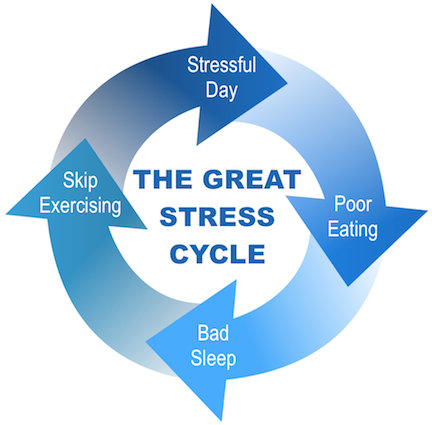Why Good Sleep is Important for Losing/Maintaining Weight
If you're looking to shed some pounds or make weight management more effortless, prioritize finding a comfortable bed and indulging in quality sleep. Aim for a minimum of 7 hours per night, but 8 or 9 would be even better. A rejuvenating night's rest can have a profound impact on your weight loss journey, including:
- Regulating your appetite
- Increasing the frequency and intensity of your workouts
- Encouraging healthier choices
- Helping you maintain optimal stress and insulin levels, which are crucial for weight management
Lack of sleep can hinder your ability to effectively manage or lose weight in various detrimental ways. So, let's explore why good sleep is a game-changer for weight control.
Good Sleep Makes You Work Out Better, Longer, Harder
Sleep deprivation will leave you feeling chronically tired, exhausted, and unmotivated to do anything but go home and crash. The consequence: less working out. Who wants to go sweat at the gym for an hour when all you can think about is sleep?
Fatigue from sleep deprivation simply means you are far less likely to work out frequently, intensely, or as long as you would if you were well rested.
In other words, if you want to have regular, high quality exercise and maximize your ability to control your weight, sleeping is a great place to start.
Good Sleep Helps Moderate Appetite
Sleep plays a critical role in helping us manage our appetite. When we don’t sleep, our body kicks in all sorts of animalistic, survival-mode behaviors. Two of these are our hunger hormones:
- Ghrelin: released in the stomach and tells your brain how full you are
- Leptin: suppresses hunger by signaling a sense of fullness in the brain
When your stomach is empty, ghrelin is high. When your stomach is full, ghrelin is low. When you are full, your leptin is high. When you are hungry, your leptin is low.
When you do not sleep, your body makes MORE ghrelin, as if your stomach were not full enough. When you do not sleep, your body also makes less leptin, leading to more hunger.
Getting good sleep helps you keep these hormones in check and responsive to actual dietary hunger needs, as studies show that people who are sleep deprived have trouble regulating these hormones [source, source].
Sleep Helps You Make Good Choices Around Food
Getting enough sleep can dramatically affect your ability to practice self-control and manage desires for weight-unfriendly foods. For example:
- Sleep deprivation keeps activity high in the frontal lobe of the brain, helping you make good decisions and practice self-control [source]
- Getting good sleep keeps reward centers in your brain balanced – lack of sleep causes the reward centers in the brain to be more stimulated by food
- Good sleep helps keep your appetite balanced for craving many types of foods, whereas lack of sleep can increase your desire for foods that are high in calories [source]
Good Sleep Helps You Maintain Healthy Cortisol Levels
 Cortisol is a stress hormone. The higher your cortisol levels, the higher your stress levels. Cortisol affects your body’s natural processes, such as fat storage and hunger. When you get enough sleep, your body is able to maintain low cortisol levels much easier.
Cortisol is a stress hormone. The higher your cortisol levels, the higher your stress levels. Cortisol affects your body’s natural processes, such as fat storage and hunger. When you get enough sleep, your body is able to maintain low cortisol levels much easier.
Sleep deprivation causes a cortisol spike in your body. In turn, this triggers your body to begin conserving energy as a survival mechanism. In simple terms: hang on to fat, don’t burn it!
Furthermore, low cortisol helps you manage hunger while high cortisol will make you hungrier.
Good Sleep Keeps Your Metabolism Regular
Good sleep will optimize your ability to have a regular, healthy metabolism because it:
- Ensures insulin sensitivity
- Ensures resting metabolism is optimal
Insulin is a hormone that either converts sugars in your bloodstream (i.e., carbohydrates) into energy or stores those sugars as fat. This decision is made by your body depending on insulin sensitivity and the amount of sugar in your body.
- High sensitivity means you produce less insulin to do the job
- When you produce less insulin, it tells your body to convert sugar to energy
- Sleep deprivation causes insulin resistance [source]
- This insulin resistance means that your body has to produce more insulin (about 30-40% [source]) to manage your blood-sugar levels
- Producing more insulin tells your body to store the sugar as fat
So, in short, lack of sleep causes you to produce more insulin and store more sugar as fat. Good sleep ensures insulin is behaving as it should.
Also, sleep may decrease your resting metabolism [source], which is the amount of calories your body burns at rest. There is conflicting evidence here, but getting good sleep will certainly NOT inhibit your metabolism. It will ensure that it functions as desired.
Sleep disorders and other causes of sleep deprivation put you far greater risk for being overweight or obese. If you are struggling with sleep and also struggling with weight, please contact our sleep specialists. Start by taking this free online sleep test.


